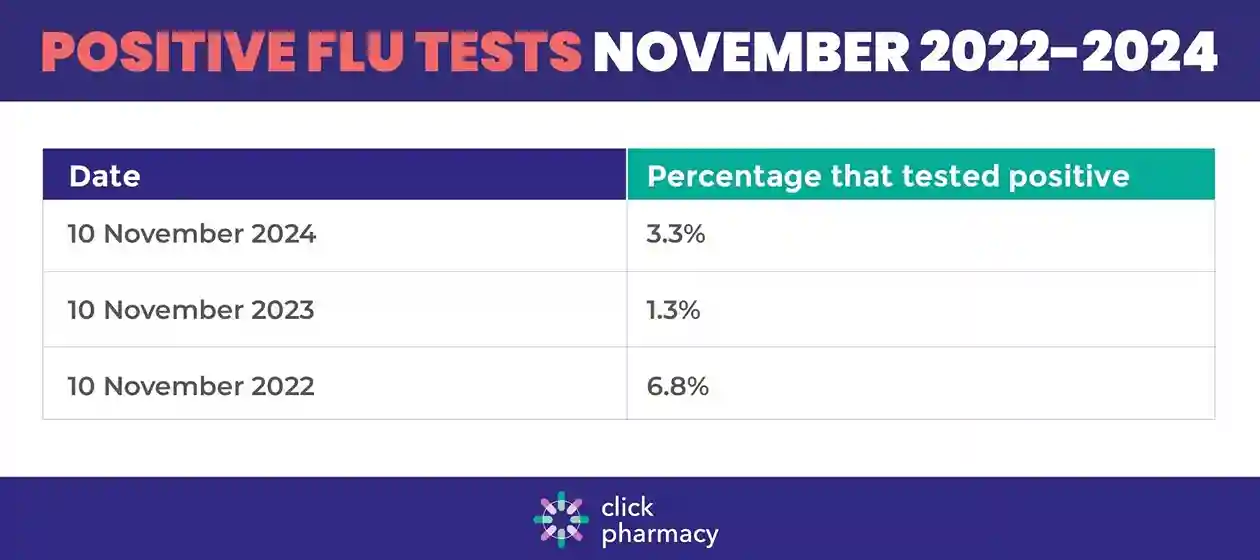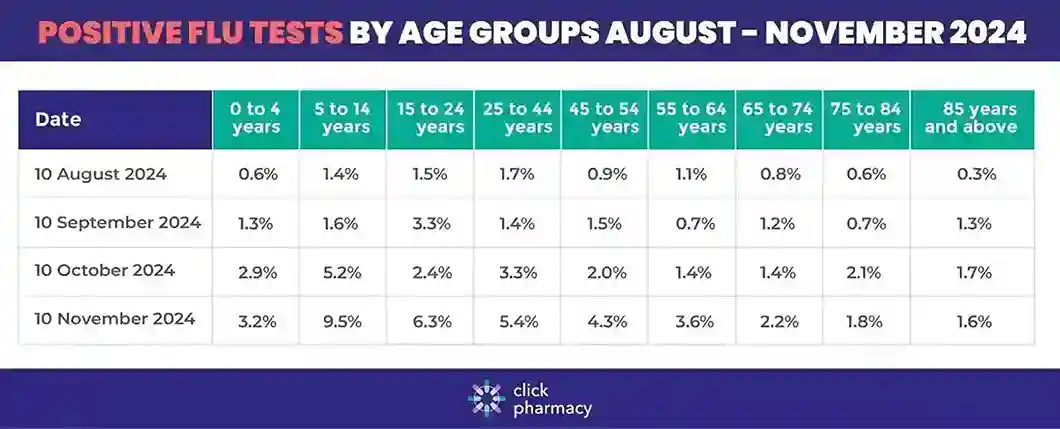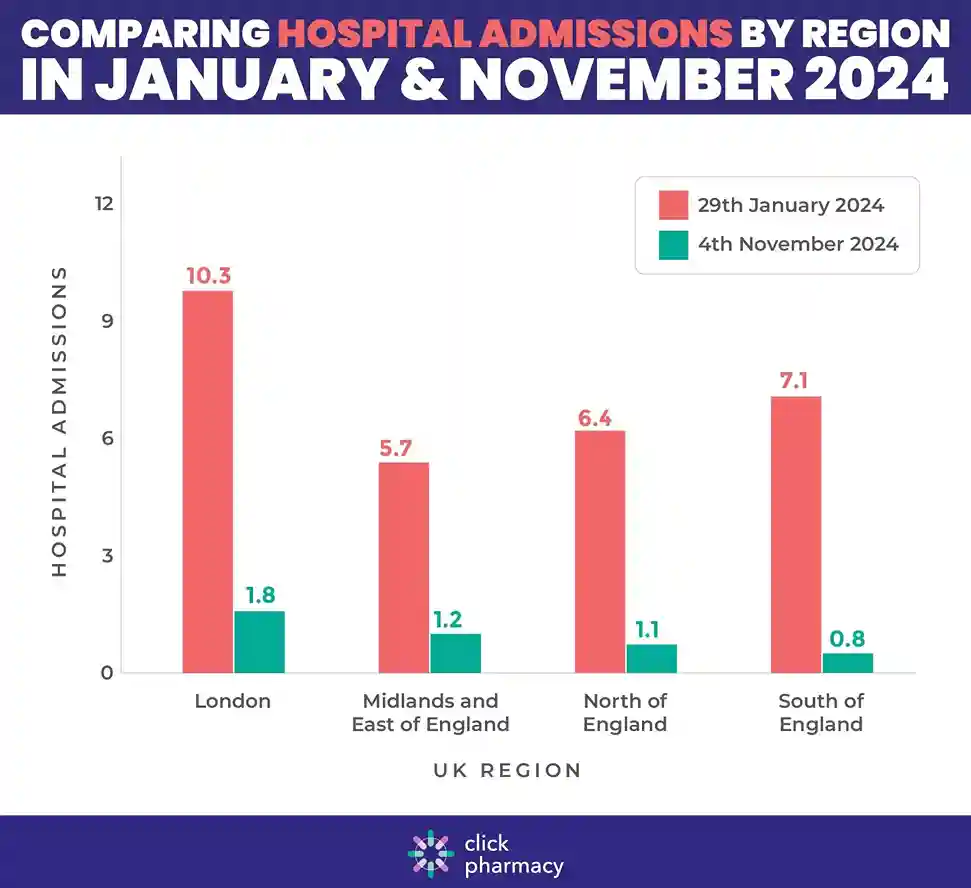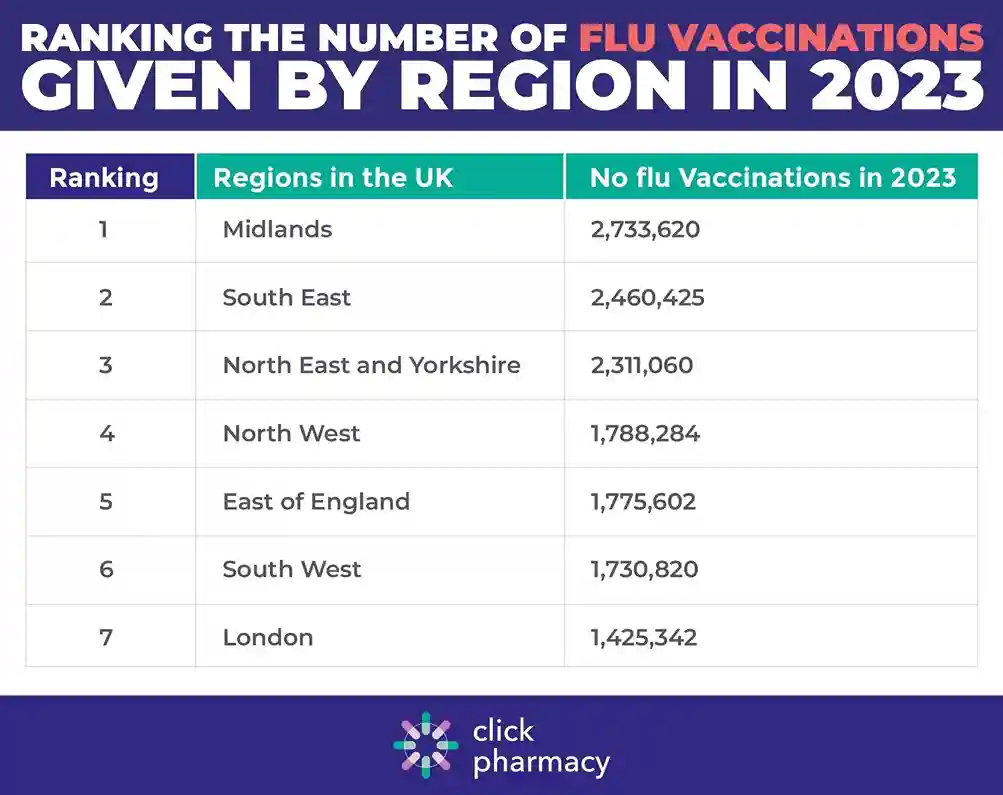22-11-2024
In the winter months, more people find themselves catching common colds and other respiratory conditions including influenza. As we start spending more time indoors, viruses can spread more easily between us, but that’s not the only reason. Colder temperatures actually weaken our immune response, with the nasal cell lining less able to fight off infection. Droplets from coughs and colds that contain viruses may also be able to hang in the air due to lower humidity.
While the common cold is certainly unpleasant, flu is a more serious condition, especially for specific groups who are more vulnerable, such as people over the age of 65 and pregnant women. That’s why the NHS offers free influenza vaccinations to eligible people.
At Click Pharmacy, we have analysed government and NHS data to find out more about the spread of flu in England this winter, as well as the number of people who have taken part in the free Seasonal Vaccination Programme.
Flu incidents
This year, the most recent government data shows that positive tests for influenza were at 3.3% in the 45th week of the year on 10 November. That’s higher than it was on the same date a year ago, when the percentage was only 1.3%. However, the percentage of tests that were positive on the same date in 2022 was over twice as high as it is this year, with 6.8% of flu tests giving a positive result.

The table below shows how age groups from 0-4 all the way up to 85+ have been more likely to test positive for influenza as the year has gone on. You can see how the number of positive cases has risen over the past 4 months.
Back in August, less than 2% of tests were positive in every age group - as of 4-10 November 2024, children aged between 5 and 14 were the most likely to show a positive test result, with 9.5% of all tests for this age group coming out positive. The next most likely age group to test positive was those aged 25-44, 5.4% of whom tested positive for influenza. The third highest percentage of positive tests came from those aged 45-54, at 4.3%.

The government data also includes the number of people hospitalised with influenza in different regions across England, according to information from the Severe Acute Respiratory Infection (SARI) surveillance scheme. As of 4 November 2024, the region where the most people were admitted to hospital with a case of flu was London, where during that week 1.8 per 100,000 trust catchment population were admitted. The Midlands and East and England and the North of England were similar at 1.2 and 1.1 respectively, with the South of England showing the lowest number of patients admitted to hospital, at 0.8 per 100,000.
Compare this to dates earlier in the year and you see a different story, with the week ending 29 January 2024 showing significantly higher numbers across each region - London had the highest number, at 10.3 per 100,000, followed by the South of England where there were 7.1 patients admitted to hospital with the flu per 100,000. The Midlands and East of England followed with 5.7, followed by the North of England with 6.4 per 100,000.

Flu vaccination data
As of 12 November, using up to date NHS data, 14,253,063 people have now been vaccinated in England from September to date through the Seasonal Vaccination Programme. The programme makes flu vaccination available to a number of higher risk people on the NHS for free - if you are not eligible for a free vaccination, you can still book in at your local pharmacy to boost your immunity for the winter, typically at a cost between £10 and £20.
The data shows that the region that has received the highest number of flu vaccines through the NHS Seasonal Vaccination Programme is the Midlands, where 2,733,620 people have been vaccinated. The second highest number of vaccinations took place in the South East at 2,460,425, and over 2 million people have also been vaccinated so far in the North East and Yorkshire at 2,311,060.

NHS data also shows how many people in three specific age groups have accessed flu vaccinations from the NHS, and as you can see, people aged over 65 have received the highest number of vaccinations at 7,764,619. These three age brackets are among the highest priority groups when it comes to delivering the flu vaccination programme, because of their vulnerability.
|
Age 65+ |
7,764,619 |
|
Children aged 2-3 |
4,31,892 |
|
School-aged children (reception to Y11) |
2,094,967 |
These cohorts do not include everyone who has had a flu vaccination, as adults below the age of 65 have not been included here, although there are many reasons why they might be eligible for free flu vaccinations on the NHS.
Adults below 65 are eligible for free vaccinations if they are pregnant, or if they work as frontline staff in health and social care. People who are at additional clinical risk are also offered influenza vaccination, including people with conditions including asthma, kidney disease, diabetes, or lowered immunity. People who have had a stroke or who have heart problems can also access the service.
The latest government data that records the uptake of vaccines on the Seasonal Vaccination Programme shows that as of 4 November, 66.6% of those aged 65 and over have had their flu vaccine, but the figure is lower in other groups. For instance, 28.7% of pregnant women, 31.5% of eligible adults under 65 and 25.4% of toddlers aged 2-3 have been in for their free vaccine.
Tips for recovering from the flu
Flu symptoms can include a high temperature, a chesty cough, a runny or blocked nose, digestive issues, and feeling tired or weak.
If you or a family member catches flu this winter, here are some tips for how to look after yourself or them.
Plenty of rest is essential, to help fight off the infection. Stay at home until you are no longer contagious, in order to help protect others from catching the virus - but staying home will also help make sure you save their strength until you feel better.
Over the counter medicines including ibuprofen and paracetamol will help - we have a section in our online pharmacy shop where you can find all our cold and flu medicines. Just answer the questionnaire and you’ll be directed to the best medicine for your symptoms.
Sources
https://www.england.nhs.uk/statistics/statistical-work-areas/flu-vaccinations/